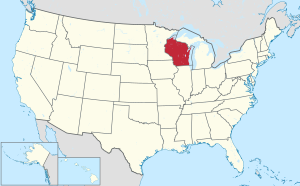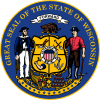
Back Wisconsin Afrikaans ዊስኮንሲን Amharic Wisconsin AN Wisconsin ANG ويسكونسن Arabic ܘܝܣܟܘܢܣܢ ARC ويسكونسين ARY ويسكونسين ARZ উইচকনচিন Assamese Wisconsin AST
Wisconsin | |
|---|---|
| Nicknames: | |
| Motto: Forward | |
| Anthem: "On, Wisconsin!" | |
 Map of the United States with Wisconsin highlighted | |
| Country | United States |
| Before statehood | Wisconsin Territory |
| Admitted to the Union | May 29, 1848 (30th) |
| Capital | Madison |
| Largest city | Milwaukee |
| Largest county or equivalent | Milwaukee County |
| Largest metro and urban areas | Milwaukee |
| Government | |
| • Governor | Tony Evers (D) |
| • Lieutenant governor | Sara Rodriguez (D) |
| Legislature | Wisconsin Legislature |
| • Upper house | Senate |
| • Lower house | Assembly |
| Judiciary | Wisconsin Supreme Court |
| U.S. senators |
|
| U.S. House delegation |
|
| Area | |
• Total | 65,498.37 sq mi (169,640.0 km2) |
| • Land | 54,153.1 sq mi (140,256 km2) |
| • Rank | 23rd[6] |
| Dimensions | |
| • Length | 311 mi (507 km) |
| • Width | 260 mi (427 km) |
| Elevation | 1,050 ft (320 m) |
| Highest elevation | 1,951 ft (595 m) |
| Lowest elevation | 579 ft (176 m) |
| Population (2024) | |
• Total | |
| • Rank | 20th |
| • Density | 108.8/sq mi (42.0/km2) |
| • Median household income | $64,168[10] |
| • Income rank | 21st |
| Demonyms | Wisconsinite, Cheesehead (colloquial) |
| Language | |
| • Official language | None |
| • Spoken language |
|
| Time zone | UTC– 06:00 (Central) |
| • Summer (DST) | UTC– 05:00 (CDT) |
| USPS abbreviation | WI |
| ISO 3166 code | US-WI |
| Traditional abbreviation | Wis., Wisc. |
| Latitude | 42° 30' N to 47° 05′ N |
| Longitude | 86° 46′ W to 92° 54′ W |
| Website | www |
| Symbols of Wisconsin | |
| Bird |
|
| Fish |
|
| Flower |
|
| Insect |
|
| Tree |
|
| Beverage | Milk |
| Dance | Polka |
| Food |
|
| Fossil |
|
| Mineral | Galena |
| Rock | Red granite |
| Tartan | Wisconsin tartan |
Wisconsin (/wɪˈskɒnsɪn/ ⓘ wiss-KON-sin)[12] is a state in the Great Lakes region of the Upper Midwest of the United States. It borders Minnesota to the west, Iowa to the southwest, Illinois to the south, Lake Michigan to the east, Michigan to the northeast, and Lake Superior to the north. With a population of about 6 million[13] and an area of about 65,500 square miles, Wisconsin is the 20th-largest state by population and the 23rd-largest by area. It has 72 counties. Its most populous city is Milwaukee; its capital and second-most populous city is Madison. Other urban areas include Green Bay, Kenosha, Racine, Eau Claire, and the Fox Cities.[14]
Wisconsin's geography is diverse, shaped by Ice Age glaciers except in the Driftless Area. The Northern Highland and Western Upland along with a part of the Central Plain occupy the state's western part, with lowlands stretching to Lake Michigan. Wisconsin is third to Ontario and Michigan in the length of its Great Lakes coastline. Its northern portion is home to the Chequamegon-Nicolet National Forest. At the time of European contact, the area was inhabited by Algonquian and Siouan nations, and today it is home to eleven federally recognized tribes.[15] Originally part of the Northwest Territory, it was admitted as a state in 1848. During the 19th and early 20th centuries, many European settlers entered the state, mostly from Germany and Scandinavia.[16][17] Wisconsin remains a center of German American and Scandinavian American culture,[18] particularly in respect to its cuisine, with foods such as bratwurst and kringle.
Wisconsin is one of the nation's leading dairy producers and is known as "America's Dairyland"; it is particularly famous for its cheese.[19][20] The state is also famous for its beer, particularly and historically in Milwaukee, most notably as the headquarters of the Miller Brewing Company. Wisconsin has some of the nation's most permissive alcohol laws and is known for its drinking culture.[21][22] Its economy is dominated by manufacturing, healthcare, information technology, and agriculture—specifically dairy, cranberries, and ginseng.[23] Tourism is also a major contributor to its economy.[24] The gross domestic product in 2020 was $348 billion.[25] Wisconsin is home to one UNESCO World Heritage Site, comprising two of the most significant buildings designed by Wisconsin-born architect Frank Lloyd Wright: his studio at Taliesin near Spring Green and his Jacobs I House in Madison.[26] The Republican Party was founded in Wisconsin in 1854; in modern elections, it is considered a swing state.
- ^ Dornfeld, Margaret; Hantula, Richard (2010). Wisconsin: It's my state!. Marshall Cavendish. p. 5. ISBN 978-1-60870-062-2. Archived from the original on September 7, 2015. Retrieved June 10, 2015.
- ^ Urdang, Laurence (1988). Names and Nicknames of Places and Things. Penguin Group USA. p. 8. ISBN 9780452009073. Archived from the original on September 6, 2015. Retrieved May 25, 2015.
"America's Dairyland" A nickname of Wisconsin
- ^ Kane, Joseph Nathan; Alexander, Gerard L. (1979). Nicknames and sobriquets of U.S. cities, States, and counties. Scarecrow Press. p. 412. ISBN 9780810812550. Archived from the original on September 6, 2015. Retrieved May 25, 2015.
Wisconsin—America's Dairyland, The Badger State ...The Copper State
- ^ Herman, Jennifer L. (2008). Wisconsin Encyclopedia, American Guide. North American Book Dist LLC. p. 10. ISBN 9781878592613. Archived from the original on September 6, 2015. Retrieved May 25, 2015.
Nicknames Wisconsin is generally known as The Badger State, or America's Dairyland, although in the past it has been nicknamed The Copper State.
- ^ "Wisconsin State Symbols" Archived February 22, 2017, at the Wayback Machine in Wisconsin Blue Book 2005–2006, p. 966.
- ^ "State Area Measurements and Internal Point Coordinates". US Census Bureau. 2010. Archived from the original on April 7, 2020. Retrieved October 22, 2023.
- ^ a b "Elevations and Distances in the United States". United States Geological Survey. 2001. Archived from the original on October 15, 2011. Retrieved October 24, 2011.
- ^ a b Elevation adjusted to North American Vertical Datum of 1988.
- ^ "United States Census Quick Facts Wisconsin". Retrieved January 5, 2025.
- ^ "Explore Census Data". data.census.gov. Archived from the original on October 5, 2021. Retrieved October 5, 2021.
- ^ "Wisconsin Population 2022 (Demographics, Maps, Graphs)". wisconsinpopulationreview.com. Archived from the original on November 18, 2022. Retrieved November 18, 2022.
- ^ "Wisconsin". Merriam-Webster.com Dictionary. Merriam-Webster.
- ^ "United States Census Quick Facts Wisconsin". Retrieved January 5, 2025.
- ^ "Census: Madison, suburbs top list of fastest-growing cities in Wisconsin". Wisconsin State Journal. Archived from the original on July 25, 2020. Retrieved July 24, 2020.
- ^ "American Indians in Wisconsin – Overview". Wisconsin Department of Health Services. August 12, 2014. Archived from the original on August 17, 2021. Retrieved August 17, 2021.
- ^ "Germans in Wisconsin". Wisconsin Historical Society. August 3, 2012. Archived from the original on August 17, 2021. Retrieved August 17, 2021.
- ^ Gordon, Scott (November 4, 2016). "How Scandinavians Transformed The Midwest, And The Midwest Transformed Them Too". WisContext. Archived from the original on August 17, 2021. Retrieved August 17, 2021.
- ^ "German and Scandinavian Immigrants in the American Midwest". Washington State University. Washington State University. Archived from the original on August 12, 2021. Retrieved August 17, 2021.
- ^ "wisconsin.uk". Archived from the original on October 25, 2019. Retrieved October 25, 2019.
- ^ Our Fifty States.
- ^ Matthews, Christopher. "The 3 Best and 3 Worst States in America for Drinking". Time. ISSN 0040-781X. Archived from the original on September 1, 2019. Retrieved October 29, 2019.
- ^ White, Laurel (May 19, 2019). "High Tolerance: How State's Drinking Culture Developed". urbanmilwaukee.com. Wisconsin Public Radio. Archived from the original on December 8, 2021. Retrieved December 8, 2021.
- ^ Adams, Barry. "Ginseng continues rebound in central Wisconsin". Wisconsin State Journal. Archived from the original on August 11, 2018. Retrieved August 11, 2018.
- ^ "Evers announces $10M to promote tourism industry in Wisconsin". WDJT-TV. August 3, 2021. Archived from the original on August 17, 2021. Retrieved August 17, 2021.
- ^ "Wisconsin". Forbes. Archived from the original on August 17, 2021. Retrieved August 17, 2021.
- ^ "The 20th-century Architecture of Frank Lloyd Wright". UNESCO World Heritage Centre. Archived from the original on July 9, 2019. Retrieved July 7, 2019.

